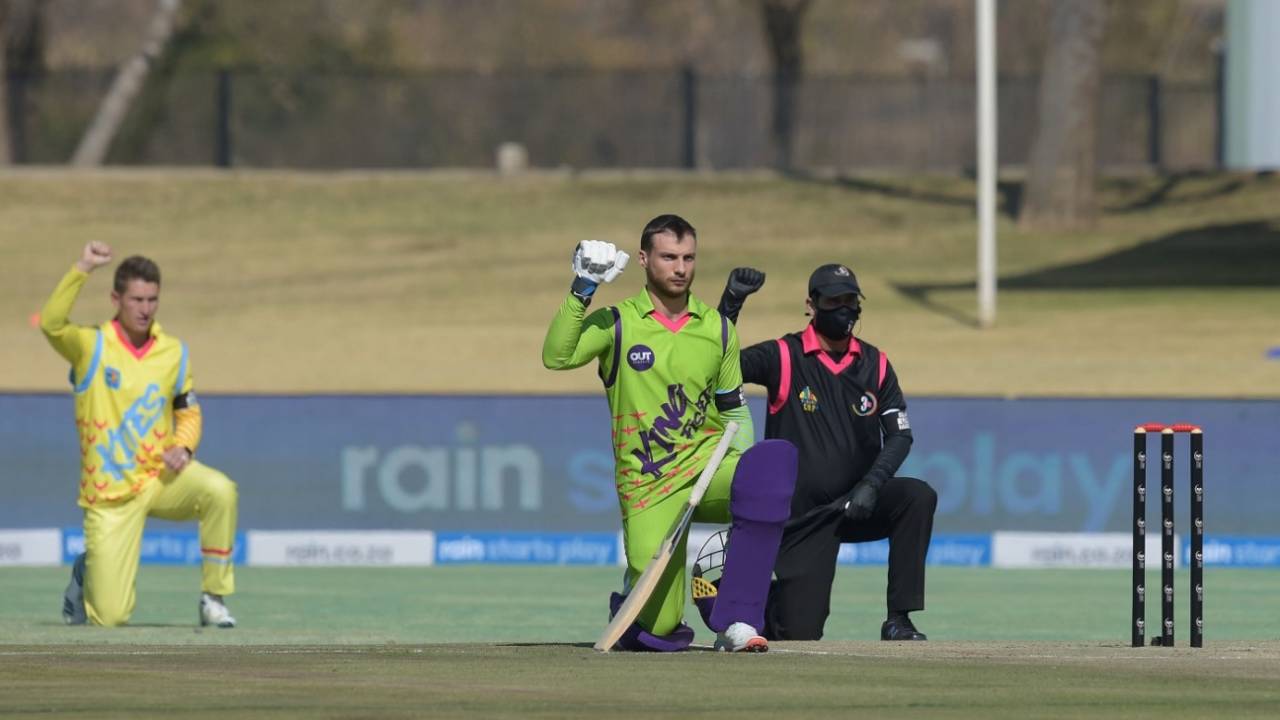Cricket South Africa's Social Justice and Nation-Building (SJN) committee will hold public hearings as the country seeks to address issues of racial discrimination in the game, with the discussion around the national team
not taking a knee still ripe.
The SJN, formed in response to
a letter from more than 30 former players and current coaches of colour during last year's Black Lives Matter (BLM) resurgence, had yet to begin its work until now. On Thursday, CSA unveiled advocate Dumisa Ntsebeza as the SJN ombudsman tasked with adjudicating the testimonies of various cricket stakeholders to understand the history of exclusion and make recommendations to CSA on mediation. The body has, so far, not committed to reparations
as was the case last year under the old board.
CSA is currently operating under a ministerially imposed interim board, which, through its member Andre Odendaal, confirmed that there has "never been a formal budget for such a [reparations] fund, neither have we created a budget for one."
Odendaal reiterated the
interim board's stance over the national team's response to BLM, specifically to them not taking a knee. "We are little disappointed that our team did not take the knee, which we explained to them at the time," Odendaal said. "We supported the taking of the knee as the interim board and the chairperson wrote to the team and to the director of cricket (Graeme Smith) and the answer was that while the team supported the stand against racism and it had been through a pre-season course of bonding and discussing these matters, they decided on a slightly different approach which the group as a whole had bought into."
While England, West Indies, New Zealand and Bangladesh have all taken a knee, Australia formed a
barefoot circle to acknowledge the Aboriginal ownership of land and South Africa
opted for a banner against both racism and gender-based violence when they played England in November. They subsequently
raised their fists ahead of the Boxing Day Test against Sri Lanka, but have yet to take a knee as a national team (all those involved in the experimental 3-Team Cricket [3TC] match last July took a knee), and this is something the board continues to be concerned about. "The board, while maintaining its own position, given the strength of the BLM and take-the-knee action throughout the world, we felt in a country with our history that would be most appropriate, [but] it was not something for us a board to decree should happen," Odendaal said. "It brought across to us that CSA should have a broad policy that all components buy into and that we would continue to talk this through with the players and the team going forward."
With the interim board and the players on different sides about the ways in which South African cricket should show support for anti-racism, developing a centralised policy on anti-racism will be one of Ntsebeza's tasks. He will only be able to do that once he has heard from those who have faced discrimination, those who have perpetrated it and even those who don't understand why it is part of the cricket conversation. He indicated that the hearings would take place on a platform like Zoom to give members of the public access to testimony. So far, several former players of colour, including
Makhaya Ntini,
Ashwell Prince, and
Thami Tsolekile, have told their stories on media platforms.
"I want to meet with all cricket stakeholders - former players, current players, the player representative body, administrators, employees, educators, sponsors, the whole gamut. I also want to meet with government, the sports ministry, non-governmental organisations and business. All of these entities are critically important because at the root of it all, the aim which is intended, is to unite this nation behind this sporting code," Ntsebeza said. "Once people are given an opportunity to say in their own words the things that hurt them, that process has the magic of restoring to them their dignity."
Ntsebeza has six months to conclude both the hearings and a report with recommendations, and he hopes by the middle of that period, in July, CSA will be ready to host a transformation conference, which will inform his recommendations. "We hope to have a whole range of cricket stakeholders together, who will seek to discuss the main issues that will have been raised in the hearings and what remedial action is required going forward."
